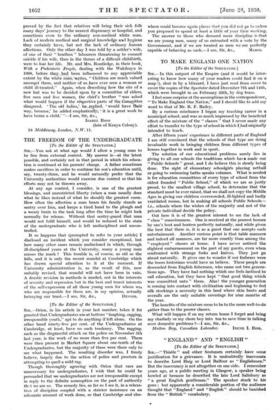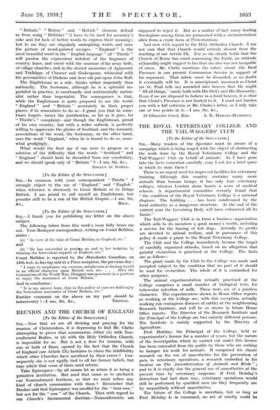" ENGLAND " AND "ENGLISH "
[To the Editor of the SPECTATOR.] Sin,—" Thistle" and other Scotsmen certainly have some justification for a grievance. It is undoubtedly inaccurate to describe Lord Haig or Lord Balfour as " Englishmen." But the inaccuracy is not altogether on one side. I remember years ago, at a public meeting in Glasgow, a speaker being howled at because he described the late Lord Salisbury as "a great English gentleman." The speaker stuck to his guns ; but apparently a considerable portion of the audience thought that "England" and "English" should be banished from the " British " vocabulary. "Britain," " Briton " and " British " (heaven defend us from using " Britisher " !) have to be used for accuracy's sake and for lack of better words to express their meaning ; but to me they are singularly uninspiring words, and raise the picture of woad-painted savages. " England " is the most beautiful word in the "English language" (if" Thistle" will pardon the expression) redolent of the fragrance of country lanes, and sweet with the murmur of far away bells, of village churches, rich in the storied memories of Agincourt and Trafalgar, of Chaucer and Shakespeare, whimsical with the personalities of Dickens and dear old put-upon John Bull.
The Englishman as a rule, thinks rather imperially than nationally. The Scotsman, although he is a splendid im- perialist in practice, is emotionally and sentimentally nation- alist rather than imperialist. The consequence is that, while the Englishman is quite prepared to use the words England" and " Britain " accurately in their proper places, if he remembers to do so—I grant you that he some- times forgets—hence the justification, so far as it goes, for " Thistle's " complaint—and though the Englishman, proud of his own country, but with a wider outlook, is perfectly willing to appreciate the glories of Scotland, and the romantic associations of the word, the Scotsman, on the other hand, uses the word England," when he is bound to do so, some- what grudgingly.
What would the Scot say if one were to propose as a solution of the difficulty that the words " Scotland " and " England " should both be discarded from our vocabulary, and we should speak only of 'Britain" ?—I am, Sir, &c., ANGLES IN SCOTIA.



















































 Previous page
Previous page